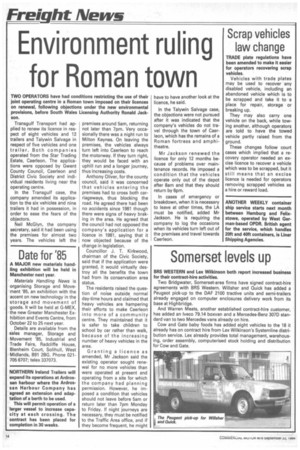Environment ruling for Roman town
Page 16

If you've noticed an error in this article please click here to report it so we can fix it.
TWO OPERATORS have had conditions restricting the use of their joint operating centre in a Roman town imposed on their licences on renewal, following objections under the new environmental provisions, before South Wales Licensing Authority Ronald Jackson.
Transgulf Transport had applied to renew its licence in respect of eight vehicles and 12 trailers and Talywin Salvage in respect of five vehicles and one trailer. Both companies operated from the Star Trading Estate, Caerleon. The applications were opposed by Gwent County Council, Caerleon and District Civic Society and individual residents living near the operating centre.
In the Transgulf case, the company amended its application to the six vehicles and nine trailers it had in possession, in order to ease the fears of the objectors.
Neil McGlyn, the company secretary, said it had been using the premises for almost two years. The vehicles left the premises around 5am, returning not later than 7pm. Very occasionally there was a night run to Milton Keynes. On leaving the premises, the vehicles always turn left into Caerleon to reach the motorway. If they turn right, they would be faced with an uphill run and a longer journey, thus increasing costs.
Anthony Oliver, for the county council, said it was concerned that vehicles entering the premises had to cross both carriageways, thus blocking the road. He agreed there had been no accidents since 1981 though there were signs of heavy braking in the area. He agreed that the council had not opposed the company's application for a licence in 1981, saying that it now objected because of the change in legislation.
Councillor J. T. Kirkwood, chairman of the Civic Society, said that if the application were granted, it would virtually destroy all the benefits the town had from its conservation area status.
The residents raised the question of noise outside. normal day-time hours and claimed that heavy vehicles are hampering their efforts to make Caerleon into more of a community centre. They maintained that it is safer to take children to school by car rather than walk, because of the increasing number of heavy vehicles in the area.
Granting a licence as amended, Mr Jackson said the existing operator sought renewal for no more vehicles than were operated at present and operating from a site for which the company had planning permission. However, he imposed a condition that vehicles should not leave before 5am or return later than 7prn Monday to Friday. If night journeys are necessary, they must be notified to the Traffic Area office, and if they become frequent, he might have to have another look at the licence, he said.
In the Talywin Salvage case, the objections were not pursued after it was indicated that the company's vehicles do not travel through the town of Caerleon, which has the remains of a Roman fortress and amphitheatre.
Mr Jackson renewed the licence for only 12 months because of problems over maintenance records. He imposed a condition that the vehicles operate only out of the depot after 8am and that they should return by 6pm.
In cases of emergency or breakdown, when it is necessary to leave at other times, the LA must be notified, added Mr Jackson. He is requiring the company to log the occasions when its vehicles turn left out of the premises and travel towards Caerleon.




























































































